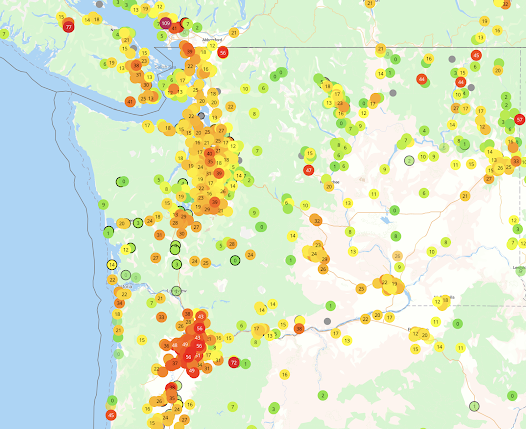Climate Tipping Points: Real Threats or Misinformation?
It seems like there is another strident climate "tipping point" headline every other day.
Threats of irreversible catastrophic climate change just around the corner.
The truth is that such claims by some media outlets and climate activists are contrary to the best science.
An attempt to sow worry and panic, with the motivation to motivate people to "do the right thing." And it is both unethical and counterproductive.
What is a climate tipping point?
According to the Merriam-Webster dictionary, a tipping point is defined as
the critical point in a situation, process, or system beyond which a significant and often unstoppable effect or change takes place
And a climate tipping point can be defined as
a critical threshold that, when crossed, leads to large and often irreversible changes in the climate system.Specifically, the idea is that increasing greenhouse gases (like CO2) will result in warming that will produce large, irreversible changes in the climate system.
Like driving off a cliff. And that reducing greenhouse gas emissions and concentrations later will not help. The changes would be irreversible. We could not go back.
Sounds scary, doesn't it?
Fortunately, the best science suggests that such tipping points do not threaten the global climate system of our planet.
Yes, global warming from increasing greenhouse gases is expected. But the resulting changes in the climate during the next century should be slow and reversible. None of the many climate simulations driven by large increases in CO2 indicate a tipping point.
Consider a collection of 20 CMIP-5 global climate model simulations, run with CO2 emissions ranging from crazy high (RCP8.5) to more probable (RCP4.5). As shown below, there is some variability in the warming for each of these warming scenarios, but NONE go up suddenly into uncontrolled warming. No tipping points. Other climate simulations suggest the same thing.
What about global warming in the Northwest?
As part of my research, I have run high-resolution climate models driven by the highly aggressive RCP8.5 scenario. Looking at a dozen regional simulations, each driven by a different international climate model, there are NO TIPPING POINTS for Seattle temperatures over the next century. Just a steady rise with some variability around the mean.
They are emphatic that there is no evidence of imminent (over the next century) tipping points for the Earth's climate. Let me provide some examples.
The loss of Arctic sea ice? This is what the IPCC (Special Report on implications of 1.5C or more warming, Chapter 3) says:
"there is little evidence for a tipping point in the transition from perennial to seasonal ice cover. No evidence has been found for irreversibility or tipping points, suggesting that year-round sea ice will return given a suitable climate"
Melting of the arctic permafrost releasing warming methane gas? No tipping point
"the carbon released to the atmosphere from thawing permafrost is projected to be restricted to 0.09–0.19 Gt C yr–1 at 2°C of global warming and to 0.08–0.16 Gt C yr–1 at 1.5°C, which does not indicate a tipping point"
Heatwaves and heatwave deaths? This is what the IPCC says
Increases in ambient temperature are linearly related to hospitalizations and deaths once specific thresholds are exceeded (so there is not a tipping point per se).
Global warming is a serious issue but there are no impending cliffs for the global climate. No imminent tipping points for the global climate.
With that being the case, some climate advocates have gotten creative and are now pushing local tipping points. One recent paper (Lenton et al., 2019) claims nine local tipping points (see below), including changes in fires and pests in Canada. Many of these claims are poorly supported by the best science.
Even the Seattle Times has joined the tipping point crowd, claiming that climate change threatens a tipping point for the Western Red Cedar (see below). As I will discuss in a future blog, this Seattle Times article is full of errors.
Climate Deception
Those pushing climate tipping points are doing the devil's work. They know that the effects of human-caused climate change are currently relatively modest. But folks aren't sufficiently motivated to take the actions the activists want. So they have decided to scare the population, with an impending, terrifying precipice of climate change.
Not ethical, not based on science. And they are causing folks psychological harm and pushing governments to make poor decisions.











Comments
Post a Comment